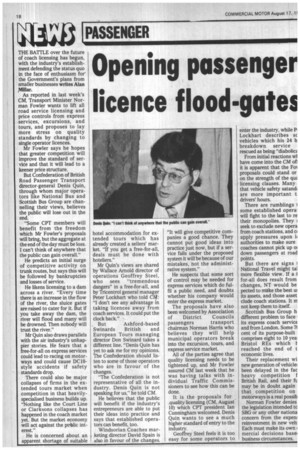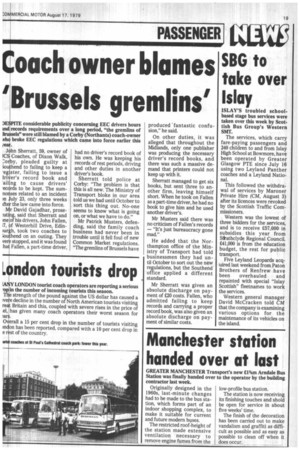Opening passenger licence flood-gates Coach owner blames 'Brussels gremlins'
Page 20

Page 21

If you've noticed an error in this article please click here to report it so we can fix it.
JESPITE considerable publicity concerning EEC drivers hours Ind records requirements over a long period, "the gremlins of Eirussels" were still blamed by a Corby (Northants) coach-owner Arho broke EEC regulations which came into force earlier this rear. THE BATTLE over the future of coach licensing has begun, with the industry's establishment defending the status quo in the face of enthusiasm for' the Government's plans from smaller businesses writes Alan Millar.
As reported in last week's CM, Transport Minister Norman Fowler wants to lift all road service licensing and price controls from express services, excursions, and tours, and proposes to lay more stress on quality standards by changing to single operator licences.
Mr Fowler says he hopes that greater competition will improve the standard of service and that it will lead to a keener price structure.
But Confederation of British Road Passenger Transport director-general Denis Quin, through whom major operators like National Bus and Scottish Bus Group are channelling their views, believes the public will lose out in the end.
"Some CPT members will benefit from the freedom which Mr Fowler's proposals will bring, but the aggregate at the end of the day must be loss. I can't think of anywhere that the public can gain overall."
He predicts an initial surge of competitive activity on trunk routes, but says this will be followed by bankruptcies and losses of service.
He likens licensing to a dam across a river. "Every time there is an increase in the flow of the river, the sluice gates are raised to cater for it. But if you take away the dam, the river will flood and many will be drowned. Then nobody will trust the river."
Mr Quin also draws parallels with the air industry's unhappier stories. He fears that a free-for-all on express services could lead to racing on motorways and could cause DC10style accidents if safety standards drop.
There could also be major collapses of firms in the extended tours market when competition in that heavilyspecialised business builds up. "Nothing like the Court Line or Clarksons collapses has happened in the coach market yet. But the market economy will act against the public interest."
He is concerned about an apparent shortage of suitable hotel accommodation for extended tours which has already created a sellers' market. "If you get a free-for-all, deals must be done with hoteliers."
Mr Quin's views are shared by Wallace Arnold director of operations Geoffrey Steel, who sees "tremendous dangers" in a free-for-all, and by Tricentrol general manager Peter Lockhart who told Cr: "I don't see any advantage in taking licences away from coach services. It could put the clock back."
But Ashford-based Swinards British and European Tours managing director Don Swinard takes a different line. "Denis Quin has yet to ask me for my opinions. The Confederation should listen to some of those operators who are in favour of the changes.
"The Confederation is not representative of all the industry. Denis Quin is not speaking for us," he told CM.
He believes that the public will benefit if the industry's entrepreneurs are able to put their ideas into practice and says that established operators can benefit, too.
Windsorian Coaches marketing director David Spain is also in favour of the changes. "It will give competitive companies a good chance. They cannot put good ideas into practice just now, but if a service fails under the proposed system it will be because of our mistakes, not the administrative system."
He suspects that some sort of control may be needed for express services which do fulfil a public need, and doubts whether his company would enter the express market.
The proposals have also been welcomed by Association of District Councils passengers transport chairman Norman Harris who believes they will help municipal operators break into the excursion, tours, and express service market.
All of the parties agree that quality licensing needs to be tightened up, and Mr Fowler assured CM last week that he was having talks with individual Traffic Commissioners to see how this can be done.
It is the proposals for .quality licensing (CM, August 10) which CPT president Ian Cunningham welcomed. Denis Quin wants to see a much higher standard of entry to the industry.
Geoffrey Steel feels it is too easy for some operators to enter the industry, while Pi Lockhart describes sc vehicles which his 24 h breakdown service rescued as being "diabolice From initial reactions wl have come into the CM of1 it is apparent that the Foil proposals could stand or on the strength of the quE licensing clauses. Many that vehicle safety satancL are more important t drivers' hours.
There are rumblings 1 some established opera.
will fight to the last to re their monopolies. They i seek to exclude new opera from coach stations, and co apply pressures upon h authorities to make sure coaches cannot pick up oi down passengers at road points.
But there are signs 1 National Travel might tal more flexible view. If a I for-all does result from changes, NT would be pected to make the best u! its assets, and those asset dude coach stations. It ni not keep them to itself.
Scottish Bus Group h different problem to face its express coach service and from London. Some 7( cent of its purpose-built comprises eight to 10 yea! Bristol REs which reached the end of t economic lives.
Their replacement wi new generation of vehicle: been delayed in the fac heavy competition f British Rail, and their fu may be in doubt again that competition on motorways is a real possib Norman Fowler denies the legislation intended to SBG or any other nationa concern from the expen! reinvestment in new veil Each must make its own mercial decisions base, business circumstances. John Sherratt, 59, owner of ICS Coaches, of Dixon Walk, 2orby, pleaded guilty at iouthend to failing to keep a .egister, failing to issue a iriver's record book and ailng to cause drivers' .ecOrds to be kept. The sumnonses related to an incident July 23, only three weeks ifter the law came into force. Mr David Gajadhar, proseuting, said that Sherratt and rne of his drivers, John Fallen, of Westerhill Drive, Edinrurgh, took two coaches to ;outhend on an outing. They verb stopped, and it was found hat Fallen, a part-time driver, had no driver's record book of his own. He was keeping his records of rest periods, driving and other duties in another driver's book.
Sherratt told police at Corby: "The problem is that this is all new. The Ministry of Transport bloke in our area told us we had until October to . sort this thing out. No-one seems to know what is going on, or what we have to do."
Mr Patrick Musters, defending, said the family coach business had never been in trouble until it fell foul of new Common Market regulations. "The gremlins of Brussels have produced fantastic confusion," he said.
On other duties, it was alleged that throughout the Midlands, only one publisher was producing the necessary driver's record books, and there was such a massive demand that printers could not keep up with it.
Sherratt managed to get six books, but sent three to another firm, leaving himself short. When he took on Fallen as a part-time driver, he had no book to give him and he used another driver's.
Mr Musters said there was no criticism of Fallen's records — "It's just bureaucracy gone mad."
He added that the Northampton office of the Ministry of Transport had told businessmen they had until October to sort out the new regulations, but the Southend • office applied a different standard.
Mr Sherratt was given an absolute discharge on payment of £20 costs. Fallen, who admitted failing to keep records and carrying a proper record book, was also given an absolute discharge on payment of similar costs.








































































































